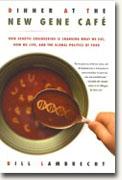Dinner at the New Gene Cafe
Bill Lambrecht
book reviews:
· general fiction
· chick lit/romance
· sci-fi/fantasy
· graphic novels
· nonfiction
· audio books
· author interviews
· children's books @
curledupkids.com
· DVD reviews @
curledupdvd.com
newsletter
win books
buy online
links
home
for authors
& publishers
for reviewers


|
Dinner at the New Gene Cafe: How Genetic Engineering Is Changing What We Eat, How We Live, and the Global Politics of Food Bill Lambrecht St. Martin's Press Hardcover 383 pages September 2001  |
|
Later, the author details how biotech companies rush to buy up seed companies in order to expand, exploit, and control more of the total production and sale of patented GMO seeds modified to be sterile: that is, seeds that cannot be legally planted or saved successfully beyond a stipulated planting/harvesting season. Monsanto's "technology protection system," called, "The Terminator," by Pat Mooney, co-founder of Rural Advancement Foundation International (RAFI), spreads a rapacious view of this news story globally. Apparently this ill-advised development, and other Monsanto-initiated proposals/ads, polarized national, international, scientific, agricultural, and cultural positions and invigorated interest groups willing to fight over perceived needs for governmental regulation of GMOs, food/environmental safety, food labeling, trade relations, "cautionary principles," and multi-national corporate interests globally. In Dinner At The New Gene Cafe, Monsanto becomes a symbol of biotechnology and science trying to win acceptance from diverse consumers, governments, environmentalists, farmers, organic food growers, native cultures, and emergent forces arguing for freedom of choice, safety, and independence from exported food technology, monopolistic U.S. corporate arrogance, greed, power, patents, and expanded global influence. Early on the author acquires surreptitiously a small quantity of genetically modified soybeans. He plants them in a vegetable garden in two rows next to a few rows of conventional beans. He reports periodically on their viability as we tread in parallel fashion down new pathways for dialogue (e.g., the internet), assessment, and collective decision making on issues now focused on free trade, GMO modified foods, food ingredients, safety, and the future of modified food crops and resistant seeds undergoing trial plantings and sabotage. This book is recommended for any one who seriously considers what they eat. The views presented are helpful not so much for conclusions reached, but more for engaging us in a dialogue about the values, role, power, and meaning of foods and the place of food sciences in societies and cultures of the world. What do we want and need to know about food today and in the future? What personal, societal, and global life chances and consequences are we willing to take with food and with what attendant risks to inhabitants, life forms, and environments everywhere on and in the planet? © 2002 by David L. Johnson, Ph. D. for Curled Up With a Good Book |
|
|
|
 Click here to learn more about this month's sponsor! |
|
| fiction · sf/f · comic books · nonfiction · audio newsletter · free book contest · buy books online review index · links · · authors & publishers reviewers |
|
| site by ELBO Computing Resources, Inc. | |
 Lambrecht follows the travails of the Monsanto Company, headquartered
in St. Louis, Missouri, when it begins to apply gene-slicing techniques in experiments
on plants. According to the author, the company intended to modify the DNA in products
like soybeans, corn, cotton, and other food commodities in order to increase resistance
to scavenger pests (e.g., corn borers, boll weevils), weeds, and chemicals like their popular herbicide, Roundup, thus, increasing the expected yield and efficiency of new GMO
seeds with more markets, trade, and profits to follow. He reports on many of Monsanto's struggles and the politicization of the new technology, promising products and applications
(e.g., golden rice) though-out the '90s.
Lambrecht follows the travails of the Monsanto Company, headquartered
in St. Louis, Missouri, when it begins to apply gene-slicing techniques in experiments
on plants. According to the author, the company intended to modify the DNA in products
like soybeans, corn, cotton, and other food commodities in order to increase resistance
to scavenger pests (e.g., corn borers, boll weevils), weeds, and chemicals like their popular herbicide, Roundup, thus, increasing the expected yield and efficiency of new GMO
seeds with more markets, trade, and profits to follow. He reports on many of Monsanto's struggles and the politicization of the new technology, promising products and applications
(e.g., golden rice) though-out the '90s.